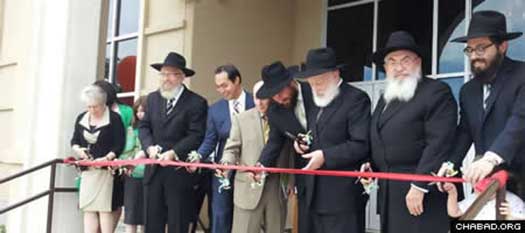
The Story Behind the Stories in New San Antonio Library
SAN ANTONIO, TX — For most of his life, Texas builder Dan Markson didn’t really know who his grandfather was. “He had a whole wall of Hebrew books, and he would study them all the time. When I was a child, it would happen every once in a while that small groups of young men with beards would come to the door—he would invite them in—and they would sit together, sometimes the entire night. But I had no idea what it all meant.”
What Markson eventually learned about his grandfather, Rabbi Yehuda Leib Hurvitt, became the legacy of the entire Jewish community of San Antonio, Texas. This month, when Markson dedicated the brand-new Hurvitt Library—a treasure trove of Jewish scholarship and history—as part of the newly constructed Chabad Center for Jewish Life & Learning in San Antonio, the whole story unfolded.
Yehuda Leib Hurvitt was a preeminent student at Tomchei Temimim, the central Chabad Torah academy founded in 1897 in the town of Lubavitch, by the fifth Lubavitcher Rebbe, Rabbi Shalom Dov Ber Schneersohn. Hurvitt, known as Reb Leib Smorgonier after his hometown of Smorgonie, White Russia, was a master of halachah (Jewish law), as well as mystical Chassidic teachings.
After immigrating in 1911 to Boston, Mass., Hurvitt carried on a lively correspondence with people around the world on a variety of Torah-related topics. In fact, he would regularly write to his father back in Smorgonie on matters of Chassidic thought. Rabbi Yosef Yitzchak Schneersohn, the dean of Tomchei Temimim who had since become the sixth Lubavitcher Rebbe, was also a correspondent of his. But the challenges of adapting to a new culture took their toll, and Hurvitt was unable to pass on his passion for Chabad-Lubavitch Chassidism and Torah scholarship to his children.
After immigrating in 1911 to Boston, Mass., Hurvitt carried on a lively correspondence with people around the world on a variety of Torah-related topics. In fact, he would regularly write to his father back in Smorgonie on matters of Chassidic thought. Rabbi Yosef Yitzchak Schneersohn, the dean of Tomchei Temimim who had since become the sixth Lubavitcher Rebbe, was also a correspondent of his. But the challenges of adapting to a new culture took their toll, and Hurvitt was unable to pass on his passion for Chabad-Lubavitch Chassidism and Torah scholarship to his children.
Markson continued studying on his own until he met Rabbi Chaim Block, director of Chabad of South Texas, at a social event. “I introduced myself and asked him if he was a Chabad rabbi. He said that he was, and I invited him to come to my home to see some old books he might be interested in,” explained Markson.
Block said he visited Markson, and “almost fell off my chair when Dan started opening boxes and pulling out handwritten transcripts of Chassidic discourses delivered in Lubavitch over 100 years ago. The manuscripts had been written by a number of hands, and it was clear that they were well-used.”
‘The Souls of Our People’
Markson was 4 when his grandfather passed away. As a child, he chose several dozen books as his portion of the inheritance before the balance was sent to the Chabad Library.
“I picked some pretty good stuff,” said Markson, noting that his collection included the first edition of Shefa Tal, written by Rabbi Shabtai Sheftel Hurwitz, son of the Shalo.
Block suggested that Markson begin studying the Chassidic discourses found in his collection with the assistance of material produced by the Chassidic Heritage Series, a division of Kehot Publication Society in New York, which publishes Chassidic discourses in English with commentary.
After doing so for a while, Markson wrote to Kehot expressing his interest in dedicating a book to his grandfather. Shortly thereafter, he received a call from Rabbi Yehuda Krinsky, chairman of Merkos L’Inyonei Chinuch, the educational arm of Chabad-Lubavitch.
“I thought he was calling to tell me that my dedication was too long or something like that,” said Markson, who didn’t know who Krinsky was at the time. “When we got on the phone, he asked me, ‘You are a grandson of Leib Smorgonier? I grew up with him in Dorchester. He was my teacher and mentor. Your grandfather was one of the founders of Chabad in Boston and one of the most learned Torah scholars in Boston.’ Until then, I did not even know that my grandfather was a rabbi.”
The two former Bostonians developed a relationship. Markson visited New York to see the library that housed the lion’s share of his grandfather’s books.
“I was expecting to see a few bookcases,” he said, and “was shocked when they took me down to see the thousands upon thousands of ancient tomes. Rabbi Krinsky pulled out an 18th-century Haggadah, and matzah crumbs fell out of it. I felt that those books contain the souls of our people throughout the generations. You could see pocket-sized books written for when our ancestors were on the run, and oversized decorated volumes of the same book from prosperous times.”
According to Block, executive director of the new center, it was Markson’s invitation that brought Krinsky across the continent for the library dedication.
Through the provenance and generosity of his close friends Edythe and Elton Kerness, Markson also donated an ancient ceramic jug that dates back to King Solomon’s era. It will be placed in the lobby of the new Chabad center. He explained that “Chassidic teachings are compared to thirst-quenching water, and this jug contains water.”
Fittingly, the dedication ceremony included a farbrengen—an informal Chassidic gathering with songs, words of Torah and inspiration—in the Hurvitt Library. After all, when the young Chassidim would come banging at Leib Smorgonier’s door so many years ago, they would come to farbreng.














wow
thats very special!
Anonymous
wow